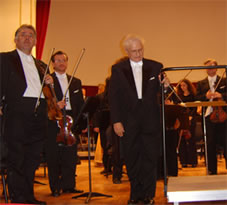 W
WErvin Acél was a Romanian conductor and pedagogue.
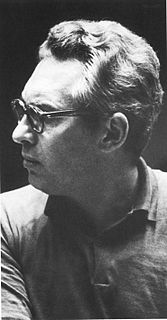 W
WGéza Anda was a Swiss-Hungarian pianist. A celebrated interpreter of classical and romantic repertoire, particularly noted for his performances and recordings of Mozart, he was also considered to be a tremendous interpreter of Beethoven, Schumann, Brahms and Bartók. In his heyday he was regarded as an amazing artist, possessed of a beautiful, natural and flawless technique that gave his concerts a unique quality. But since his death in 1976 at the age of fifty-four, his high reputation has faded somewhat from view. Most of his recordings were made on the Deutsche Grammophon label.
 W
WPiotr Anderszewski is a Polish pianist and composer.
 W
WImre Antal was a Hungarian pianist, television presenter and comedian.
 W
WGergely Bogányi is a Hungarian pianist. Coming from a musical family, Gergely Bogányi is one of the youngest pianists to have won the Kossuth Prize, becoming one of the leading pianists of his generation.
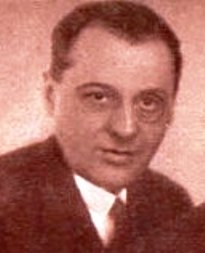 W
WBuday Dénes was a Hungarian composer, born in Budapest. He was a well known composer of both poems and music for films made between 1930 and 1950. Buday studied at the Academy of Music, which is today known as the Franz Liszt Academy of Music, where his teacher, Hans von Koessler, held his lectures in German.
 W
WImre Czomba is a Los Angeles-based Composer, Film Composer, Orchestrator, Arranger, Music Producer, and Musician. A prominent figure in the International Music scene since 1993, he is most recognized for his numerous theatrical compositions and productions, including musicals, international events, and dance theatre shows. Imre earned international acclaim for his 18-year collaboration with ExperiDance, a famous dance troupe whose shows premiered in top theaters across Europe and Asia. His international repertoire includes compositions for the 2008 Summer and 2014 Winter Olympic Games, and the 2013 European Judo Championship and the 2006 European Aquatic Championship Official Song. In 2008 and 2009 Imre was selected to compose music for the prestigious Hungarian National Day firework shows, each with a viewership of over 3 million people. Czomba has worked with world-famous star friends as Kenny G, Michael Boddicker, Alphonso Johnson, Ed Calle, Richie Garcia, Michael O'Neill (musician) etc. on his #QuarantineMusicChain project.
 W
WKarl Doppler was a Hungarian flute virtuoso, conductor, music director, composer. He was the younger brother of the composer Franz Doppler and father of the composer Árpád Doppler.
 W
WBéla Drahos is a Hungarian conductor and flautist.
 W
WLászló Fassang Hungarian organist, pianist and improviser.
 W
WJános Ferencsik was a Hungarian conductor.
 W
WÁdám Fischer is a Hungarian conductor. He is the general music director of the Austro-Hungarian Haydn Orchestra, chief conductor of the Danish National Chamber Orchestra, and chief conductor of the Düsseldorf Symphony.
 W
WGyörgy Fischer was a Hungarian pianist and conductor.
 W
WFerenc Fricsay was a Hungarian conductor. From 1960 until his death, he was an Austrian citizen.
 W
WJános Fürst was a Hungarian-born conductor and violinist.
 W
WÁdám György is a Hungarian pianist. György started his music studies at the age of four. While studying under Katalin Halmagyi, he was accepted to the Béla Bartók Conservatory of Budapest in 1994. György won the National Youth Piano Competition in 1998 and the Hungary's Pianist 2000 award two years later. From 2000 to 2006, Ádám attended the Franz Liszt Academy of Music in Budapest, where he studied under György Nador and Balázs Reti. Currently, he is pursuing graduate studies at the Franz Liszt Academy, and he is director of the Adam György Castle Academy. On 8 June 2012 he performed at the opening ceremony of the UEFA Euro 2012 in Warsaw, Poland.
 W
WEndre Hegedűs is an internationally known piano soloist. He graduated from Franz Liszt Academy of Music as a pianist, both performing artist and teacher in 1980. Since 1999 he has been a professor of the Academy.
 W
WAgi Jambor was a Hungarian pianist.
 W
WBéla Kéler was a Hungarian composer of romantic music period and orchestral conductor. Béla Kéler was born as Albert Paul Keler. He is also known in Hungarian as Kéler Béla. He was born on 13 February 1820 in City of Bártfa, Sáros County, Kingdom of Hungary, Austrian Empire, and died on 20 November 1882 in Wiesbaden, German Empire. He was active in Hungary, Austria and Germany.
 W
WIstván Kertész was an internationally acclaimed Hungarian orchestral and operatic conductor who, throughout his brief career led many of the world's great orchestras, including the Cleveland, Chicago, Philadelphia, New York, Los Angeles, Pittsburgh, Detroit, San Francisco and Minnesota Orchestras in the United States, as well as the London Symphony, Vienna Philharmonic, Berlin Philharmonic, Royal Concertgebouw Orchestra, Israel Philharmonic, and L'Orchestre de la Suisse Romande. His orchestral repertoire numbered over 450 works from all periods, and was matched by a repertoire of some sixty operas ranging from Mozart, Verdi, Puccini and Wagner to the more contemporary Prokofiev, Bartók, Britten, Kodály, Poulenc and Janáček. Kertész was part of a musical tradition that produced fellow Hungarian conductors Fritz Reiner, Antal Doráti, János Ferencsik, Eugene Ormandy, George Szell, János Fürst, Ferenc Fricsay, and Sir Georg Solti.
 W
WTibor Kozma was an American conductor, pianist, accompanist, and vocal coach of Hungarian birth. He began his career as an opera conductor in Europe and Ecuador before emigrating to the United States in 1941; ultimately becoming a United States citizen in 1945. He worked as a conductor, accompanist, and vocal coach in New York City during the 1940s and 1950s, notably serving on the conducting staff of the Metropolitan Opera from 1950-1957. He then had a successful teaching career at the Jacobs School of Music at Indiana University from 1957 until his death 19 years later.
 W
WErvin László is a Hungarian philosopher of science, systems theorist, integral theorist, originally a classical pianist. He is an advocate of the theory of quantum consciousness.
 W
WGeorge Lichtenstein was a Hungarian pianist and music teacher who lived and worked in Edinburgh, Scotland.
 W
WArthur Nikisch was a Hungarian conductor who performed internationally, holding posts in Boston, London, Leipzig and—most importantly—Berlin. He was considered an outstanding interpreter of the music of Bruckner, Tchaikovsky, Beethoven and Liszt. Johannes Brahms praised Nikisch's performance of his Fourth Symphony as "quite exemplary, it's impossible to hear it any better."
 W
WMitja Nikisch was a classical pianist and dance band leader, born in Leipzig, Germany on May 21, 1899 and died in Venice, Italy on August 5, 1936.
 W
WEugene Ormandy was a Hungarian-American conductor and violinist, best known for his association with the Philadelphia Orchestra, as its music director. His 44-year association with the orchestra is one of the longest enjoyed by any conductor with a single orchestra. Under his baton, the Philadelphia Orchestra had three gold records and won two Grammy Awards.
 W
WZoltán Peskó was a Hungarian conductor and composer who held leading positions at German, Italian and Portuguese opera houses and orchestras, including the Deutsche Oper Berlin, Teatro Comunale di Bologna, La Fenice, and Teatro Nacional de São Carlos. He was a regular conductor at La Scala, where he promoted contemporary opera.
 W
WIsidor Edmond Philipp was a French pianist, composer, and pedagogue of Jewish Hungarian descent. He was born in Budapest and died in Paris.
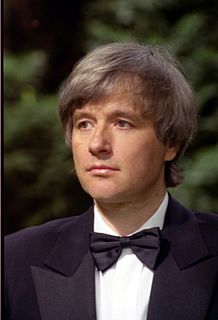 W
WDezső Ránki is a Hungarian virtuoso concert pianist with a broad repertoire and a significant discography of solo, duo and concerto works.
 W
WErnö Rapée was an Estonian-born American symphonic conductor in the first half of the 20th Century whose prolific career spanned both classical and popular music. His most famous tenure was as the head conductor of the Radio City Symphony Orchestra, the resident orchestra of the Radio City Music Hall, whose music was also heard by millions over the air.
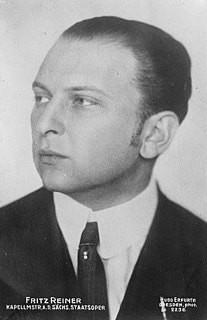 W
WFrederick Martin "Fritz" Reiner was a prominent conductor of opera and symphonic music in the twentieth century. Hungarian born and trained, he emigrated to the United States in 1922, where he rose to prominence as a conductor with several orchestras. He reached the pinnacle of his career while music director of the Chicago Symphony Orchestra in the 1950s and early 1960s.
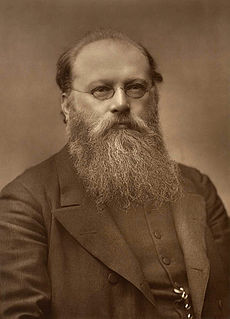 W
WHans Richter was an Austrian–Hungarian orchestral and operatic conductor.
 W
WSzabolcs Sándor conductor, accompanist, pianist
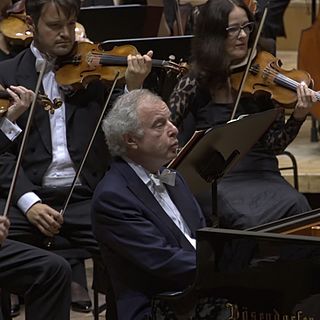 W
WSir András Schiff is a Hungarian-born Austro-British classical pianist and conductor, who has received numerous major awards and honours, including the Grammy Award, Gramophone Award, Mozart Medal, and Royal Academy of Music Bach Prize, and was appointed Knight Bachelor in the 2014 Queen's Birthday Honours for services to music. He is also known for his public criticism of political movements in Hungary and Austria.
 W
WJános Sebestyén was a Hungarian organist, harpsichordist, pianist and journalist.
 W
WGyörgy Sebők was a Hungarian-born American pianist and professor at the Indiana University's Jacobs School of Music in Bloomington, Indiana, United States.
 W
WAnton Seidl was a famous Hungarian Wagner conductor, best known for his association with the Metropolitan Opera in New York City and the New York Philharmonic.
 W
WLászló Simon was a Hungarian pianist.
 W
WSir Georg Solti, was a Hungarian-born British orchestral and operatic conductor, best known for his appearances with opera companies in Munich, Frankfurt and London, and as a long-serving music director of the Chicago Symphony Orchestra. Born in Budapest, he studied there with Béla Bartók, Leó Weiner and Ernő Dohnányi. In the 1930s, he was a répétiteur at the Hungarian State Opera and worked at the Salzburg Festival for Arturo Toscanini. His career was interrupted by the rise of the Nazis' influence on Hungarian politics, and being of Jewish background he fled the increasingly harsh Hungarian anti-Jewish laws in 1938. After conducting a season of Russian ballet in London at the Royal Opera House he found refuge in Switzerland, where he remained during the Second World War. Prohibited from conducting there, he earned a living as a pianist.
 W
WHans Swarowsky was an Austrian conductor of Hungarian birth.
 W
WBalázs Szabó is a Hungarian organist, harmonium d´art player and OrganExpert.
 W
WAlex Szilasi is a Hungarian-Italian pianist. He graduated from the Ferenc Liszt Academy of Music in Budapest in 1993, where his professors were Ferenc Rados, Sándor Falvai and Péter Solymos. Szilasi gave his first recital in 1977 in Budapest. He has been a regular participant at international music festivals and has given concerts in England, Germany, France, Italy, Switzerland, Austria, Turkey, Russia, USA, South Korea, Canada and Poland. In 2001, he became the director of the "Esther" collection and the complete edition of Chopin, presented by Editions Fuzeau (France).47
 W
WIstván Thomán was a Hungarian piano virtuoso and music educator. He was a notable piano teacher, with students including Béla Bartók, Ernő Dohnányi and Georges Cziffra. His six-volume Technique of Piano Playing is still in use today.
 W
WImre Ungár was a Hungarian pianist.
 W
WTibor Varga was a violinist, conductor, and world renowned music teacher who developed pedagogic methods for teaching string music. He was a founding member of the string department in the Detmold music conservatory.
 W
WNándor Zsolt was a Hungarian violinist, conductor, composer and the professor of violin at the Franz Liszt Academy of Music.